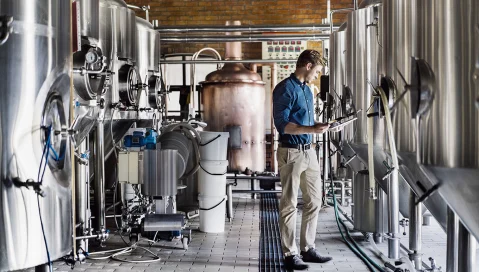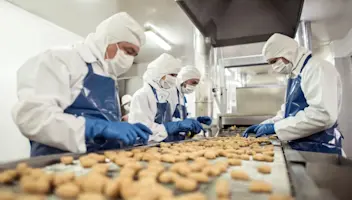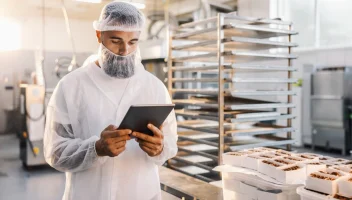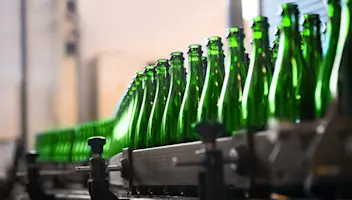En vedette dans cet article
5 Beverage Industry Trends: New Challenges and Opportunities Bubbling Up
5 Beverage Industry Trends: New Challenges and Opportunities Bubbling Up
2 Avr 2024
John McCurdy
“Refreshing.”
It’s a word often said with a smile on your face as you lower a glass or bottle from your mouth after taking a sip. It evokes feelings of relief, relaxation and renewal—and it’s what a beverage should be.
It’s also a good descriptor for something novel or eye-opening, like a new product on store shelves or an emergent development in consumer preferences. That’s fitting, as the focus of this blog post is on the five biggest trends in the beverage industry. But first, let’s review some of the latest statistics to get an idea of how the industry as a whole is doing.
Overall indicators are positive, as Statista projects the global beverage market will reach $141.9 billion by the end of 2024 and continue to grow at a robust compound annual growth rate (CAGR) of 9.73% through 2029.
Further, our recent research conducted in conjunction with B2B International revealed that 71% of soft drink businesses and 80% of alcohol businesses, across the North American and European markets, expect higher profits this year compared to 2023.
Of course, as a beverage industry professional yourself, those numbers are bound to get your juices flowing, eager to come up with ways your company can seize a bigger share of a burgeoning market. So, with no further ado, let’s explore the five beverage industry trends you should keep top-of-mind moving forward to keep your brand relevant and products in-demand.
1. Thirst for the Functional and Healthy
Functional beverages—those that offer health benefits beyond hydration and the expected nutritional content—are not new, but they continue to grow in popularity. This category includes protein shakes and smoothies, as well as probiotic-packed kombuchas, mushroom-infused matchas, nootropic sparkling waters and much more.
Other drinks designed for health and wellness are on the rise, too. We see this in the prevalence of sugar-free sodas, sports drinks that replenish electrolytes lost in sweat and flavored waters that deliver on taste without any unnecessary additives. And plant-based alternatives to dairy products aren't just lactose-free—they're also lower in calories.
2. Low- and No-Alcohol Options
While the alcoholic beverage vertical isn’t showing any major signs of decline, the “sober-curious” movement is gaining momentum, especially among Generation Z consumers. They’re pushing non-alcoholic beers, seltzers and liquors into the spotlight, as those offer the taste of a hard drink without the drawbacks of alcohol consumption.
Ready-to-drink “mocktails” are also a big part of the non-alcoholic market, and many are made with premium ingredients and in flavors both exotic and enticing. However, there has been criticism of the price points at which they’re sold—amid a cost-of-living crisis, paying the same amount as one would for a regular cocktail can be hard to justify.
4. New Caffeine Consumption Preferences
The morning cup of joe isn’t what it once was, at least not for Gen Z coffee drinkers—they want their latte or nitro brew iced and preferably cold-brewed. They’re also more likely to get their fix at a coffee shop rather than making it at home, and they don’t necessarily look at coffee as something they need to start every day and often choose to go without it.
Energy drinks are an alternative option for those who want a boost, and the brands that have remained successful continue to innovate, introducing electrolyte and CBD varieties. That said, shoppers are sometimes scared away by their price tags, and those with very high caffeine content are under scrutiny due to health concerns.
5. Sustainability Gaining Greater Traction
Environmental, societal and governance (ESG) considerations are now major priorities for corporations, especially those that want to protect their brand image and avoid negative press. Consumers have shown that they’re willing to pay more if it means that companies can lower their carbon footprints, and that’s certainly the case in the beverage industry.
As such, many beverage manufacturers are choosing to procure ingredients locally to minimize emissions and differentiate their products. Reducing packaging and using recyclable materials is also vital. Deposit return schemes (DRS) to keep single-use plastic bottles out of landfills are gaining traction, having already been implemented in the EU.
The Next Step: Fortify Your Beverage Business’s Digital Foundation
The time is now to align your business and products with these beverage industry trends. Each stands to become more pronounced with time, which means that your organization’s ability to adapt and adjust in the near future will be a considerable factor in not just short-term revenue, but long-term viability and popularity.
To achieve the level of operational flexibility necessary to capitalize on new opportunities and meet consumers’ changing demands, beverage industry technology is your greatest ally. Specifically, an enterprise resource planning (ERP) system can deliver the forecasting, formulation, data management and real-time analytics tools required to thrive in today’s market.
Among our purpose-built food and beverage software, Aptean Beverage ERP is the ideal solution for businesses like yours. As a full-fledged ERP built from the ground up with your unique challenges in mind, it comes with the highly specialized functionalities you need, including empty goods, deposit, tax and customs documentation management.
What’s more, our ecosystem extends to complementary solutions, including product lifecycle management (PLM) software for streamlined new product development and accelerated time-to-market. And our advanced route optimization software can help you excel in distribution as well, with optimized route planning that maximizes efficiency.
Ready to learn more about how the beverage industry is changing and the vital role digital transformation plays in this dynamic market? Contact us or request a personalized demo today.
Related Content


Prêt à améliorer votre entreprise de fabrication de boissons ?
L’ERP d’Aptean conçu pour le secteur des boissons simplifie la complexité de vos opérations.






